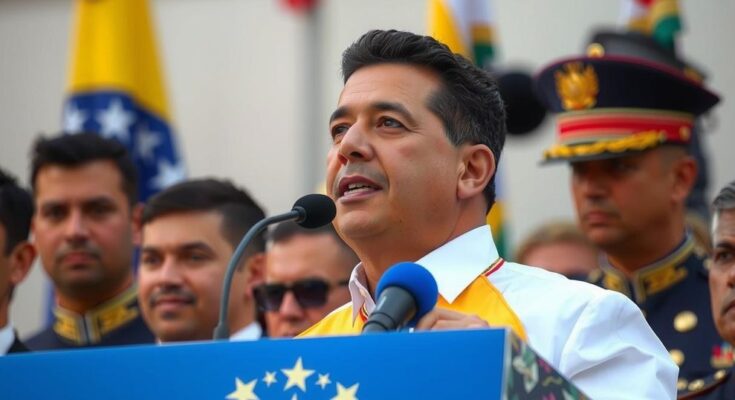Nicolás Maduro has been sworn in for a third term amid allegations of electoral fraud, with the opposition claiming electoral victory backed by evidence. International recognition of the opposition leader González complicates the situation, as Maduro’s regime asserts authority despite widespread condemnation. The political climate in Venezuela reflects increasing authoritarianism and challenges to democracy in Latin America.
On Friday, Nicolás Maduro was sworn in for a contested third term as president of Venezuela, asserting his grip on power despite significant allegations of electoral fraud. This event is not unprecedented, as previous elections have also faced accusations of illegitimacy; however, it is significant that the opposition has now produced evidence purportedly demonstrating its victory. Observers have characterized these elections as perhaps “the largest electoral fraud in recent Latin American history.”
The Washington Post, alongside independent election monitors, verified documentation from the opposition indicating that María Corina González decisively defeated Maduro, leading to discussions about the implications for democracy in the region. Carolina Jiménez Sandoval, president of the Washington Office on Latin America, expressed concerns that Venezuela’s situation sets a “dangerous precedent” for Latin American democracies, emphasizing the apparent disregard for the will of the populace in conjunction with an ongoing authoritarian regime.
As Maduro’s inauguration neared, the opposition leader González intended to return to Venezuela, having gained recognition as the president-elect from the United States and several other nations. However, his plans are complicated by threats of detention from Maduro’s administration, which issued a bounty for his arrest. Consequently, the situation remains precarious for the opposition, particularly coinciding with Maduro’s repressive measures such as border closures and military preparations surrounding the ceremony.
International response to Maduro’s inauguration has been mixed, with many leftist leaders from Latin America choosing not to attend. Colombia’s foreign minister signaled the country’s refusal to endorse Venezuela’s election results, albeit maintaining diplomatic relations. Historical context reveals that these tensions continue on the eve of the incoming Trump administration, previously marked by a hardline stance towards Venezuela.
Trump’s administration, under Sen. Marco Rubio’s influences, had sought to reinstigate severe sanctions against Maduro; nonetheless, such strategies have often been critiqued for failing to instigate meaningful political change within Venezuela. The Biden administration briefly attempted a new approach with Maduro, only for negotiations to collapse as the regime continued its oppressive tactics against opposition figures and obstructed foreign electoral monitoring efforts.
Despite these challenges, the coordinated efforts among opposition supporters garnered significant public backing for González, with an impressive collection of voting data that fundamentally counters Maduro’s legitimacy. Independent organizations, including the Carter Center, corroborate evidence of González’s apparent electoral success, thus intensifying the discourse surrounding Venezuela’s ongoing political crisis and democratic integrity.
The political situation in Venezuela has escalated over the past few years, with Nicolás Maduro’s presidency marked by severe controversies surrounding electoral legitimacy and human rights violations. His rule has drawn considerable international condemnation, particularly from Western nations that recognize opposing leaders as legitimate representatives of the Venezuelan populace. Recent elections, described as marred by fraud, have heightened tensions within the country and sparked extensive regional discourse on democracy and governance in Latin America.
In conclusion, Nicolás Maduro’s inauguration for a contested third term raises significant concerns regarding the legitimacy of electoral processes and the state of democracy within Venezuela. The opposition, led by González, claims a decisive victory, supported by verified voting documentation, yet faces severe government repression. International response remains divided, spotlighting the challenges of dealing with an authoritarian regime that refuses to acknowledge electoral accountability. As global leaders navigate the complexities of engaging with Venezuela, the road ahead remains fraught with uncertainty for both Venezuelans and democratic principles in the region.
Original Source: www.washingtonpost.com




